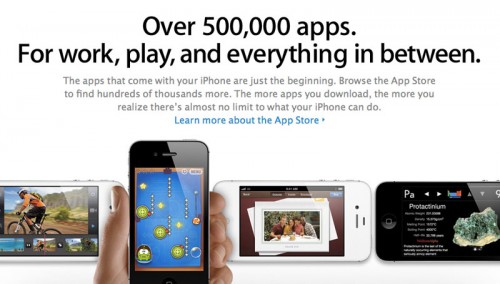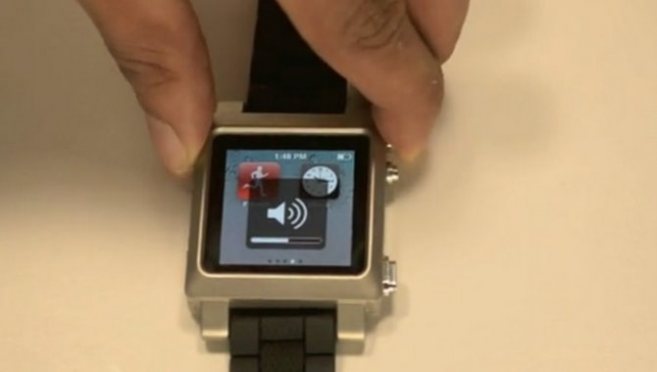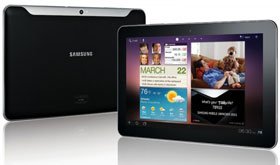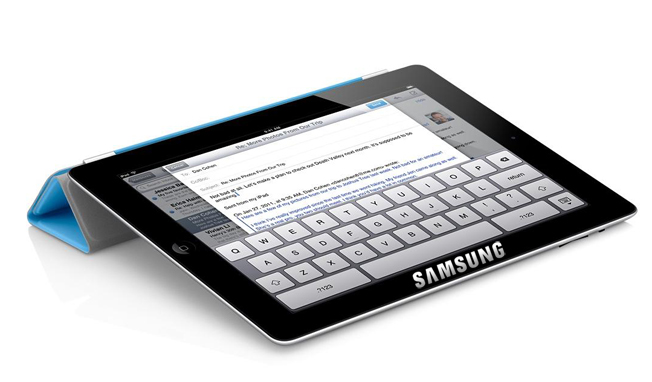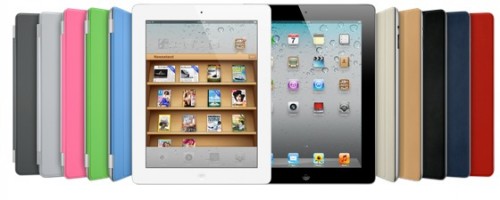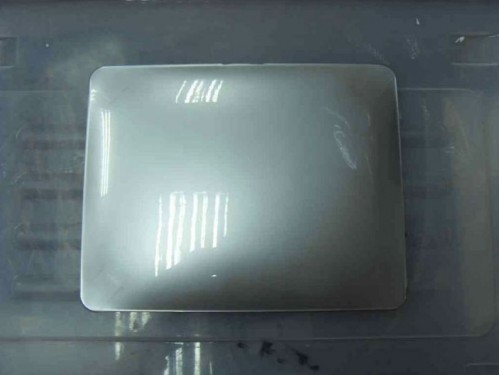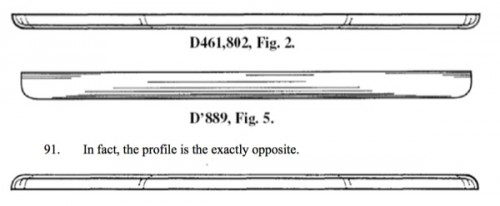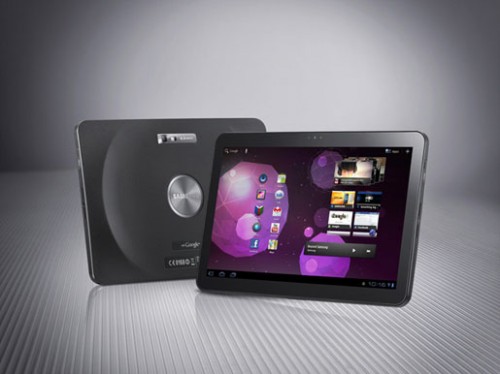News tagged ‘Tablet’
Apple sues Samsung over patented iPad, iPhone case designs
Apparently, Apple and Samsung are not going to stop their war involving numerous lawsuits related to alleged patent and design infringement in their tablet and smartphone products. According to Bloomberg, this time Apple has sent a notice of infringement to Samsung over the company's tablet and smartphone cases. The company plans to pursue legal action
Apple Inc., which on Dec. 9 lost a bid to keep Samsung Electronics Co.’s Galaxy 10.1 tablet out of Australia, claims the case for the device and cases for Samsung phones infringe its patents and registered design.
Apple issued the notice of infringement to Samsung in Australia over the cases, and will file a statement of claim, Apple’s lawyer Stephen Burley said at a hearing in Sydney today. Samsung’s lawyer Katrina Howard said at the same hearing the company was served with the notice that the cases infringe at least 10 patents.
To be honest, Samsung’s "Smart Case" for the Galaxy Tab 10.1 closely resembles the iPad 2 Smart Cover. The company quickly clarified that the product was not in fact approved by Samsung and was immediately pulled before it had begun selling. Though Samsung offers several styles of cases for the Galaxy Tab 10.1 at that moment, it is not clear which one Apple is considering to infringe its case designs.
RIM now worth less than Apple's App Store alone
Research in Motion is struggling now for its share of the mobile market. But the price of its stocks is getting lower and lower, so the company is worth less than the estimated value of just Apple's App Store. An analysis from Trefis' Brian S. Hall notes that at a price of $13.44, RIMM stock finished last week at a total value of just $7.04 billion, less than the $7.08 billion that Apple's App Store is estimated to be worth. As for the whole Apple company, AAPL stock has a market cap of $354 billion, or more than 50 times greater than RIMM.
"The App Store is probably worth more than BlackBerry," Hall wrote. "All of BlackBerry. Just the App Store. Nothing else. Not the iPhone or iPod. Not Mac. Just the App Store."
App Store is now one of the key components of Apple’s success. Just a year of Apple's iTunes Store and App Store’s operation costs Apple $1.3 billion, but last year only developers received $2.5 billion in payments in the App Store. According to a last week report, iOS applications bring in 300 percent more revenue than their Android counterparts.
RIM's stock has been showing decline in the price since the company announced last week that BlackBerry shipments reduced year over year while the company managed to ship just 150,000 PlayBook tablets last quarter. Moreover the company delayed the release of its next-generation smartphone operating system, BlackBerry 10, until the second half of 2012.
Rumors: Apple Has Been Researching And Prototyping Small Wearable Devices
Nick Bilton from The New York Times, who in October that large parts of rumoured Apple’s television sets appeared in the company's supple chain, now that Apple may be researching and even prototyping new wearable devices.
Apple's next-gen iPad arriving in 3-4 months, suppliers say
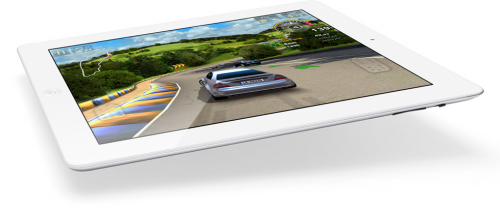
Apple suppliers now claim that the next generation of iPads will arrive on the market in the next 3-4 months. Manufacturing partners of the company have reportedly begun delivering parts and components for the third-generation iPad while reducing the iPad 2 production, through it is expected to remain steady at 14-15 million units in the December quarter, before declining to 4-5 million units in the first quarter of 2012. The same sources said that production of the iPad 3 will reach 9.5-9.8 million units next quarter.
China's Commercial Times has reported that Apple will begin producing the device in January ahead of large-scale production in February. Moreover, analysts suggest that there left no significant technical hurdles for the device.
The iPad 3 is expected to include a high resolution Retina Display. Last month we reported that Apple invested in a Sharp factory for production of LCD panels for the next iPad that will be utilize IGZO (indium, gallium, zinc) technology to provide a thinner design and improve battery life. However, the recent report from Japanese source claims that iPad 3 will be little thicker that the current-generation Apple’s tablet because of unknown reasons.
Samsung to Try to Beat Apple to Market with a "Retina" Display Tablet
BGR reports that Samsung is preparing to launch its own high resolution tablet that will carry a 2560 x 1600 resolution screen that would beat the 2048x1536 display that the iPad 3 has been rumored to have.
Even though the tablet features a larger display than Samsung’s Galaxy Tab 10.1, we’re told that the tablet is “barely larger” due to the fact the slate will have a thinner bezel with a whopping 2560 x 1600 resolution, 11.6-inch screen with a 16:10 aspect ratio.
Samsung introduced a similar 2560x1600 screen that uses the less conventional PenTile technology to achieve its high resolution back in May at SID Display Week 2011 International Symposium.
The PenTile display uses a series of local filter operations to convert the underlying image into display intensities, including convolution, thresholding, color curve adjustment, and postprocessing with locally-adaptive filters. In practice, this means the display blurs the red and blue channels by dispersing these color intensities to the nearest subpixel element of the right color, and then also implements subpixel positioning to increase the apparent resolution again. However, subpixel spacing is not constant across the display, making the real apparent resolution complicated to estimate.
Rumors that Apple has been working on the high resolution display have been circulating about a year. Apple's iPad 3 is expected to carry a resolution of 2048x1536 both vertical and horizontal ones. Rumors have suggested that there have been production constrains on creating these high resolution screens in quantities that are enough to satisfy Apple’s needs.
Samsung Is Set To Release A "Retina" Display Tablet In February
The ongoing competition between Apple and Samsung may become more intense in February. According to BGR t, Samsung is going to launch 11.6 inch tablet that will have 2560 x 1600 resolution display.
Retina Display-Equipped iPad 3 to Launch in February
According to a research note issued by Citi analyst Richard Gardner, the next-generation iPad will be introduced in February.
According to "several sources" the next iPad will launch in February, and it will sport a screen with double the resolution of the current model.
Gardner says, "there do not appear to be any significant technical hurdles remaining" to prevent a launch of a high-resolution iPad, despite rumors to the contrary.
Some of the prior reports of a mid-winter launch for the iPad 3 suggested that Apple's display suppliers were struggling with mass production of the higher-resolution 2048x1536 displays. It still unclear is whether the next-generation Apple’s tablet will be thinner or slightly thicker than the iPad 2. Some sources claim that it will be slightly thicker due to use a dual light bar system that is necessary for the Retina Display. But others suggest that Apple will use a new technology that will allow the iPad 3 to be slightly thinner than the current model.
Cloud Gaming Company OnLive Releases Its App For Tablets And Mobile Platforms
The pioneer of cloud gaming has the release of its playable app for tablets and mobile devices. Now top-tier, console-class games that was previously limited only to computers and consoles are available for playing through the free on more than half a million mobile devices over mobile networks and Wi-Fi in the UK and US.
Apple's iPad 3 will be slightly thicker with same screen size
Citing an Asian supplier who is allegedly crafting components for Apple's next iPad, Japanese blog Macotakara claims that Apple's third-generation iPad will be slightly thicker than the iPad 2 for an "unknown reason." That means that third-party cases that cover the back side of the device won’t fit to the iPad 3, but Apple’s Smart Covers will remain compatible with the next-generation Apple’s tablet.
The screen of the iPad 3 will have the same 9.7-inch screen size as the iPad 2, but Apple is rumored to implement the Retina Display technology into the next-generation iPad. One reason for a thicker frame on the iPad 3 could be the components necessary to include a high-resolution Retina Display.
In order to include a Retina Display, Apple may adopt entirely new display technology. One report in November suggested Apple would use IGZO displays from Sharp to reach a 330 dots-per-inch screen resolution. But that report claimed the IGZO display would also allow for a future iPad to be thinner, not thicker. Other reports, however, claimed that Apple would utilize a dual-LED light bar system to illuminate the Retina Display of a third-generation iPad. Apple's apparent difficulties with the higher resolution displays and new LED backlight designs were said to have already affected the launch schedule of the next iPad.
The Retina Display technology was firstly introduced by Apple with the 2010 iPhone 4. Apple boasts that an individual pixel on such screen is so small that cannot be distinguished by the human eye.
Now Flipboard App Is Available On iPhone And iPod Touch
Today social magazine service Flipboard the launch of a of its iPad app, which adds compatibility for the iPod touch and iPhone. Flipboard allows users to gather information from such sources as blogs, social networks, news sites, offering the content in an easy-to-use magazine form. The new version allows users to access their favorite social networks and content saved on the iPad edition of the app via their Flipboard Account.
Apple May Lose Rights To iPad Name In China
In October Taiwan-based company Proview Electronics charged Apple with trademark infringement related to the “iPad” name and the chairman promised to bring a legal action against Apple for damages in both China and US. Apple quietly acquired the global rights to the iPad trademark and also filed a suit to obtain the rights in China that apparently were not covered by the agreement. According to Reuter’s , today Intermediate People’s Court in Shenzhen rejected Apple’s suit to acquire ownership over the trademark in China.
Read the rest of this entry »
Apple Admits to Court that Samsung Will Draw More Customers from Android than iOS
Early today, we have reported that the U.S. judge declined to issue a preliminary injunction barring Samsung from selling several of its Galaxy smartphone and tablet devices in the United States. We have also mentioned the court order that had been redacted and which revealed that Apple had licensed one specific iOS interface patent to both Nokia and IBM. Now Reuters reports how this court order came to light.
In her 65-page ruling denying Apple's request for a preliminary injunction against Samsung, Koh attempted to redact nearly two dozen sentences or short fragments. But because of a formatting characteristic in the prior electronic version, the redacted material can be viewed by copying text from the PDF and pasting it into another document.
In the court order Koh cites as part of her rationale Apple's admission that Samsung is more likely to take market share from other Android manufacturers than it is from Apple.
Apple Fails to Win U.S. Injunction Against Samsung
Late last week, a U.S. judge Lucy Koh declined to award a preliminary injunction over Galaxy line of smartphones and tablets in the United States. The Judge admitted that Samsung infringed some of Apple's patents, but she declined to issue a ban, because of a lack of evidences.
In her ruling, Koh wrote that for some of the smartphones, "Apple has established a likelihood of success on the merits at trial."
Koh added that Apple would likely prove Samsung infringed one of its tablet patents. However, Apple had not shown that it was likely to overcome Samsung's challenges to the patent's validity, Koh wrote.
Apple must demonstrate both infringement and validity to succeed in its lawsuit.
Interestingly, Apple has licensed to third parties one key iOS patent covering the "scrollback" feature displaying the linen texture when elastically scrolling beyond the end of a document or webpage. Licenses for the patent were obtained by Nokia and IBM, and Apple offered a license to Samsung.
Apple asserted this patent against Samsung as part of its failed attempt to get an injunction against Galaxy devices, and the court order denying the injunction includes general discussion of how past licensing behavior affects the decision of whether or not to grant an injunction. The discussion is nestled among two redacted statements shown to The Verge that confirm the '381 patent was licensed to IBM and Nokia, and that Apple offered a license to Samsung in November of 2010 as part of settlement negotiations.
The fact that Apple has been willing to gain profit from a license offered to other companies undermines its argument that it is being irreparably harmed by Samsung's alleged infringement.
Apple offered alternative designs for Galaxy Tab
Comparison of iPad and Galaxy Tab profiles
The Verge reports that Apple offered an alterative design for Samsung’s Galaxy Tab 10.1 in its July court case seeking a sales ban of the Galaxy Tab 10.1. Apple gave Samsung a list of tweaks that would allow the company to differentiate the two tablets (iPad and Galaxy Tab) and start selling Samsung’s Galaxy Tab not violating Apple’s patents.
The Korean electronics company argued that the patents Apple is using against the Galaxy Tab were based on functionality, and are thus required by all smartphones and tablet computers as part of a basic utilitarian design that is why Samsung had to use the design elements in question. But Apple believes that Samsung could use other options and that the Korean company purposely violated standing patents. To prove its point, Apple generated a list of possible alternatives that included:
- A front surface that is not black.
- A shape that is not rectangular.
- No rounded corners.
- A front surface that is not flat.
- Varying Bezel size.
- A device that is not thin.
- A cluttered appearance.
In response, Samsung slightly changes design of its tablet and rebranded it the Galaxy Tab 10.1. However, Apple did not find these changes sufficient to warrant the lifting of the injunction.
Samsung Galaxy Tablet Ban in Australia Lifted, Apple to Appeal
Sydney Morning Herald reports that an Australian court has overturned a preliminary injunction against Samsung's Galaxy Tab 10.1. Apple was able to extend the ban until Friday at 4pm while it prepares for an appeal to the High Court.
The full bench of the Federal Court - Justices John Dowsett, Lindsay Foster and David Yates - today unanimously reversed a Federal Court judge's ruling last month that Samsung's Galaxy Tab 10.1 be banned from sale in Australia.
"Samsung will be permitted to launch the Galaxy Tab 10.1 in Australia provided it keeps accounts of all transactions involving that device in Australia," the judges wrote in their judgment.
The original ruling came last month from Justice Annabelle Bennett. Following the initial injunction, Samsung was quick to appeal the decision in hopes of releasing the device in time for the valuable Christmas shopping season. Samsung lawyer Neil Young said in October that the Galaxy Tab 10.1 would be "dead" if it was delayed past Christmas.

 Leave a comment
Leave a comment